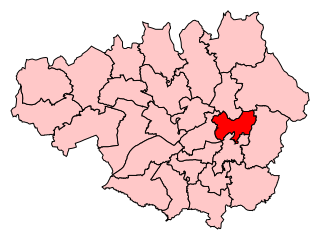The Ashton-under-Lyne by-election, 1920 was a by-election held on 31 January 1920 for the British House of Commons constituency of Ashton-under-Lyne.
By-elections, also spelled bye-elections, are used to fill elected offices that have become vacant between general elections.

In the United Kingdom (UK), each of the electoral areas or divisions called constituencies elect one member to a parliament or assembly, with the exception of European Parliament and Northern Ireland Assembly constituencies which are multi member constituencies.

Ashton-under-Lyne is a constituency centred on the town of Ashton-under-Lyne that is represented in the House of Commons of the UK Parliament since 2015 by Angela Rayner of the Labour Party, who has served as Shadow Secretary of State for Education since 1 July 2016 and Shadow Minister for Women and Equalities since 27 June 2016. It is considered a safe seat for Labour; in the most recent six national elections its voters have given strong majorities to the Labour Party candidate.
Contents
The by-election was triggered by the elevation to the peerage of the town's Conservative Party Member of Parliament (MP) Albert Stanley, who was ennobled as Baron Ashfield.

The Conservative Party, officially the Conservative and Unionist Party, is a centre-right political party in the United Kingdom. Presently led by Theresa May, it has been the governing party since 2010. It presently has 314 Members of Parliament in the House of Commons, 249 members of the House of Lords, and 18 members of the European Parliament. It also has 31 Members of the Scottish Parliament, 12 members of the Welsh Assembly, eight members of the London Assembly and 9,008 local councillors. One of the major parties of UK politics, it has formed the government on 45 occasions, more than any other party.

Albert Henry Stanley, 1st Baron Ashfield,, born Albert Henry Knattriess, was a British-American businessman who was managing director, then chairman of the Underground Electric Railways Company of London (UERL) from 1910 to 1933 and chairman of the London Passenger Transport Board (LPTB) from 1933 to 1947.
The result was a victory for the Conservative candidate Sir Walter de Frece, who held the seat with a massively reduced majority.
Sir Abraham Walter de Frece was a British theatre impresario, and later Conservative Party politician, who served as a member of parliament (MP) from 1920 to 1931. His wife was the celebrated male impersonator, Vesta Tilley.
British Pathe has a newsreel clip of Sir Walter Frece campaigning in the by-election with his wife. http://www.britishpathe.com/video/miss-vesta-tilley/query/election

